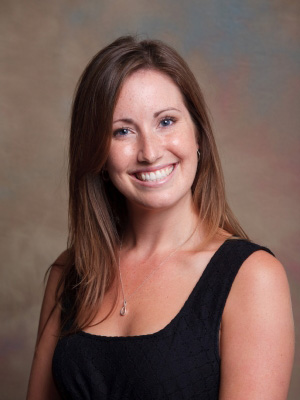
Kate Giapponi Schneider, PhD’16, is a research scientist at the Institute for Child, Youth and Family Policy (ICYFP) and the 2024 recipient of Heller’s Early Career Research Investigator Award. With nearly two decades of experience working with state and federal agencies to conduct research related to child care subsidy policy, she is committed to advancing the utility of research for program and policy application through her work on federal research grants.
Tell me about your research.
The vast majority of my work at ICYFP involves studying child care subsidy policy. In particular, I’ve studied changes in child care subsidy policies and practices, and their impact on low-income families’ subsidy stability and access to care. I’ve studied the impact of changes in COVID-19-related policies on families’ experiences with subsidy renewal. I’ve also conducted research investigating the factors influencing child care providers’ decisions to participate in the subsidy system. This involved identifying barriers to participation that can limit the supply of subsidized care, and potential changes in policies and practices that could increase this supply. I’ve also conducted research on child care providers’ perceptions of quality and investigated whether preschool absenteeism is associated with kindergarten absenteeism. The quality of child care programs can impact early educational outcomes for those children attending them, so understanding how we can improve the supply of high-quality care — especially for those using child care subsidies — is a major area of interest for me.
How did you become interested in child care and early education?
I’ve conducted research and consulting projects on child care and early education for nearly 20 years. Before I entered the Heller PhD program, I worked in consulting for various state and local human services agencies. I worked on a range of projects, from conducting program evaluations and needs assessments, to business process reviews, to survey research for child welfare, juvenile justice, public assistance, and child care subsidy lead agencies. I started to home in on early education and child care subsidies because I could see that affordable, accessible, high-quality child care is not only a linchpin for parental employment but also for healthy child development and, ultimately, the future workforce of this country.
What are you currently working on?
I’m conducting research under two federal research grants that are offered through the U.S. Office of Planning, Research, and Evaluation: a Child Care Policy Research Partnerships grant and a Coordinated Evaluations of Child Care and Development Fund Policies and Initiatives grant, for which I’m a co-principal investigator. Since 2013, we’ve partnered with the Massachusetts Department of Early Education and Care to conduct research under these and similar grants, which has been wonderful because the research that we do can directly inform the policies and practices they implement. Our projects are primarily geared toward producing findings at the state level, but they also apply to other states and have implications for the federal government.
Elizabeth Wong, a Heller PhD candidate, and I were recently awarded a 2024 Federal Reserve Bank of Boston Visiting Fellowship to study factors associated with whether child care providers offer care during nontraditional work hours. Findings from our study will help identify potential policy levers and business practices that can increase the availability of child care that meets the needs of working families with nonstandard schedules.
What’s something you’d like policymakers to understand?
As researchers, we try to control for as many variables as possible and provide the most rigorous research that we can, including conducting interviews and focus groups with child care providers, subsidy administrators, and families to understand what is happening on the ground. However, the research takes time and so we may not be able to provide evidence as quickly as we’d like. Finding the right balance between the rigor of the research and the timing of findings needed to impact policy can be challenging, but that’s also why I love this work.
How did Heller prepare you for your work as a researcher?
Heller was the perfect place for me to pursue my interests because it’s an applied research school and that’s exactly what I wanted to be — an applied researcher. I had the opportunity to learn from and work alongside talented faculty and staff with amazing experience and connections to state and federal policymakers. My education at Heller has made a huge impact on my career today.
